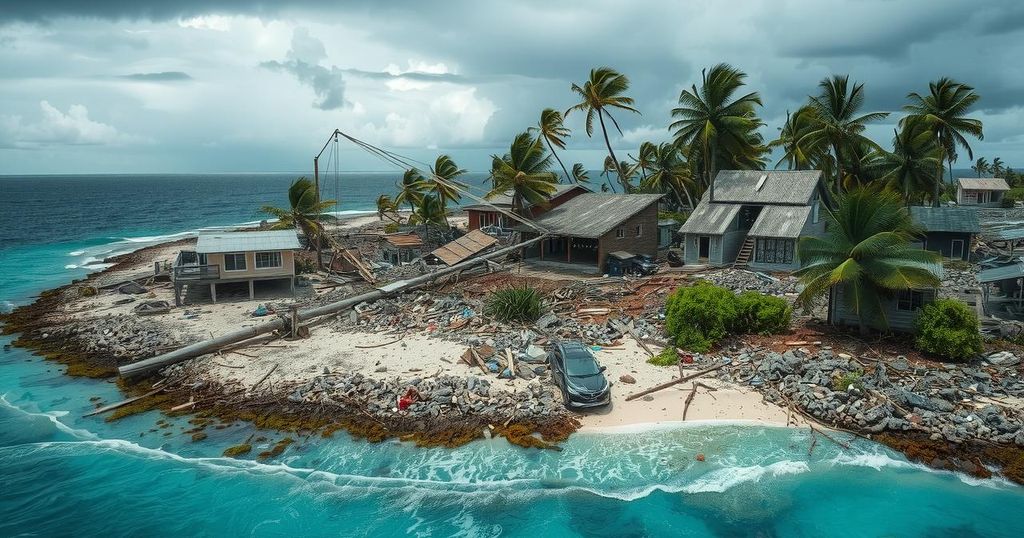World news
AFD, AFRICA, BELGIUM, CHI, CLIMATE COUNCIL, EMERGENCY RESPONSE, ESTE, ESTELLE YOUSSOUFFA, EUROPE, EUROPEAN COMMISSION, FRANCE, FRENCH DEVELOPMENT AGENCY, HURRICANE BERYL, IDA, ITALY, KENNETH, NATURAL DISASTER, NATURAL DISASTERS, NORTH AMERICA, SWEDEN, UNITED STATES
Daniel O'Connor
0 Comments
Cyclone Chido Devastates Mayotte: The Urgent Need for Climate Resilience
Cyclone Chido, a Category 4 storm, devastated Mayotte in December, resulting in at least 35 fatalities and extensive destruction to infrastructure, leaving much of the island inaccessible. The cyclone represents the most severe weather event in the region in nearly a century. Global assistance efforts are underway to support recovery and highlight the urgent need for climate resilience as extreme weather events increase in frequency due to climate change.
In December, the French archipelago of Mayotte was battered by Cyclone Chido, a Category 4 storm, marking the most severe cyclone to strike the territory in 90 years. The cyclone’s winds, reaching 136 miles per hour, caused catastrophic damage, leveling neighborhoods and destroying schools and hospitals. Tragically, at least 35 lives have been lost, with fears that the toll may escalate. Two-thirds of the island became inaccessible due to power outages and collapsed communication systems, posing significant challenges for rescue efforts.
This cyclone is particularly alarming as it affected a region that has faced numerous extreme weather events. The archipelago’s vulnerabilities have been highlighted in the French Development Agency’s strategy for 2022-2026, which notes the susceptibility of Mayotte to climate-related disasters. Furthermore, the Climate Council emphasizes that changing climate conditions result in more intense tropical cyclones.
In response to the devastation, the European Commission is facilitating emergency assistance to the affected communities in both Mayotte and Mozambique. Several countries, including Belgium, Germany, Italy, and Sweden, have pledged support by providing shelter and essential supplies. The EU’s Copernicus Emergency Management Service has begun mapping efforts to streamline relief operations, with Mozambique set to receive significant humanitarian aid focused on critical needs such as water and healthcare. The focus on transitioning to cleaner energy sources to combat climate change has never been more urgent, given the rising frequency of such extreme weather events.
Cyclone Chido is emblematic of the escalating impacts of climate change, particularly on vulnerable regions such as Mayotte. Situated off the eastern coast of Africa, Mayotte is part of a historic cycle of extreme weather, including previous devastating storms that shaped its current socio-economic landscape. The French Development Agency’s strategy underscores the archipelago’s increasing vulnerability to climate phenomena exacerbated by global warming, aligning with broader scientific consensus on the intensification of natural disasters amidst climate change. Understanding the broader context, Cyclone Chido is not an isolated incident but part of a worrying trend where intensified tropical storms correlate with warmer oceanic temperatures, highlighting the critical need for proactive disaster preparedness and a global commitment to sustainable energy alternatives.
Cyclone Chido’s impact on Mayotte serves as a stark reminder of the increasing vulnerability of coastal communities to extreme weather events exacerbated by climate change. The devastation caused by this cyclone calls for immediate humanitarian assistance and highlights the pressing need for global action towards climate resilience and sustainable energy practices. Collaboration among nations and a commitment to addressing the root causes of climate change are imperative to mitigate future disasters.
Original Source: www.thecooldown.com




Post Comment